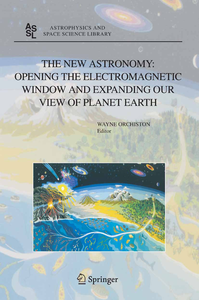Radiophysics field stations and the early development of radio astronomy
Orchiston, Wayne, and Slee, Bruce (2005) Radiophysics field stations and the early development of radio astronomy. In: Orchiston, Wayne, (ed.) The New Astronomy: opening the electromagnetic window and expanding our view of planet earth: a meeting to honor Woody Sullivan on his 60th birthday. Astrophysics and Space Science Library, 334 . Springer, Dordrecht, The Netherlands, pp. 119-168.
|
PDF (Published Version)
Restricted to Repository staff only |
||
![[img]](https://researchonline.jcu.edu.au/5010/2.hassmallThumbnailVersion/5010_Orchiston_2005.gif)
|
Image (GIF) (Book cover)
Download (100kB) |
Abstract
During the period 1946–1961 Australia was one of the world’s leading nations in radio astronomy and played a key role in its development. Much of the research was carried out at a number of different field stations and associated remote sites situated in or near Sydney which were maintained by the Commonwealth Scientific and Industrial Research Organisation’s Division of Radiophysics. The best-known of these were Dover Heights, Dapto, Fleurs, Hornsby Valley and Potts Hill. At these and other field stations a succession of innovative radio telescopes was erected, and these were used by a band of young scientists—mainly men with engineering qualifications—to address a wide range of research issues, often with outstanding success.
| Item ID: | 5010 |
|---|---|
| Item Type: | Book Chapter (Research - B1) |
| ISBN: | 978-1-4020-3723-8 |
| Keywords: | radio astronomy; Australia; field stations; Badgerys Creek; Dapto; Dover Heights; Fleurs; Georges Heights; Hornsby Valley; Murraybank; Penrith; Potts Hill; solar radio emission; ‘radio stars’; H-line emission |
| Date Deposited: | 17 Sep 2009 04:46 |
| FoR Codes: | 22 PHILOSOPHY AND RELIGIOUS STUDIES > 2202 History and Philosophy of Specific Fields @ 100% |
| SEO Codes: | 97 EXPANDING KNOWLEDGE > 970102 Expanding Knowledge in the Physical Sciences @ 100% |
| Downloads: |
Total: 152 Last 12 Months: 3 |
| More Statistics |



